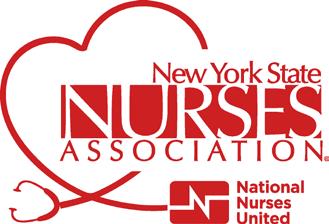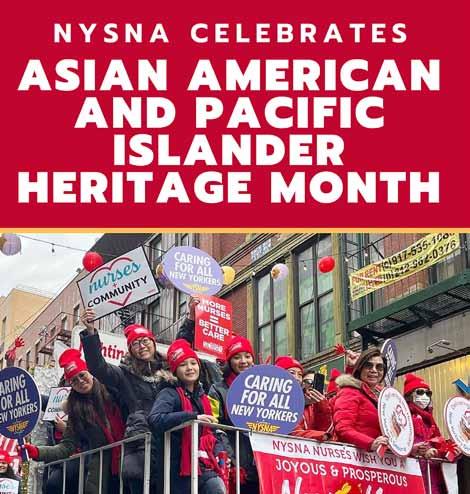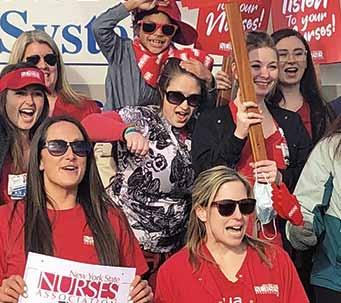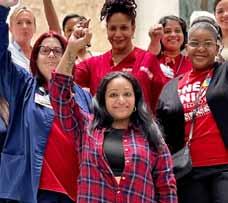Our fight for health equity



May marked Labor History Month, and I participated in two events recently that reminded me of the long history of labor struggle in this country and how NYSNA nurses are continuing in that tradition of struggle — and making history in the process.

BOard Of directOrs
President
nancy Hagans, rn, Bsn, CCrn nancy.hagans@nysna.org
first Vice President
Judith Cutchin, , D np rn, M sn judith.cutchin@nysna.org
second Vice President Marion Enright, rn marion.enright@nysna.org
secretary
n ella pineda-Marcon, rn, BC nella.pineda-marcon@nysna.org
treasurer Jayne L. Cammisa, rn, Bsn jayne.cammisa@nysna.org
directors at Large Matt Allen, rn, Bsn matt.allen@nysna.org
Marie Boyle, rn, Bsn marie.boyle@nysna.org
s eth B. Dressekie, rn, M sn pMH np, BC seth.dressekie@nysna.org

Flandersia Jones, rn, Bsn, M pH flandersia.jones@nysna.org
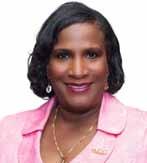
Michelle Jones, rn, M sn, A np-C michelle.jones@nysna.org
s onia M. Lawrence, rn, Bsn sonia.lawrence@nysna.org
Benny K. Mathew, rn, M s , CCrn, CEn, sCrn benny.mathew@nysna.org
Ari Moma, rn, M s A ari.moma@nysna.org
Jean Erica padgett, rn jean.padgett@nysna.org
regional d irectors
s outheastern Christopher Honor, rn, Bsn,CApA christopher.honor@nysna.org
southern Aretha Morgan, rn, M sn aretha.morgan@nysna.org
Central Catherine Dawson,rn,CnOr,Msn catherine.dawson@nysna.org
Lower Hudson/nJ Margaret Franks, rn
Western Vacant
Eastern Bill s chneider, rn, CCrn bill.schneider @nysna.org
editor Kristi Barnes
e xecutive editor
pat Kane, rn, Cn O r
Executive Director
editorial offices located at:
131 W 33rd st., n ew York, n Y 10001
phone: 212-785-0157
Email: nynurse@nysna.org
Website: www.nysna.org
subscription rate: $33 per year
issn ( print) 1934-7588/ issn (Online) 1934-7596
©2023, All rights reserved
I spoke at an event to commemorate the anniversary of the Triangle Shirtwaist Factory Fire and to memorialize the 146 workers — mostly immigrant women and girls — who perished on March 25, 1911. When a fire broke out on the top factory floors, the garment workers could not escape. The exits were locked, which was common in sweatshops at that time, and the firefighters’ ladders and water from the hoses could not reach the building’s ninth floor. Dozens of women and girls jumped to their deaths from the windows to escape the fire, as horrified witnesses looked on.
This tragedy was one of the worst disasters since the beginning of the Industrial Revolution and became a clarion call to improve working conditions in New York and throughout the country. In the fire’s aftermath, the International Ladies Garment Workers Union and other unions and advocates mobilized to support the survivors and victims’ families and to advocate for safer conditions as well as shorter working hours, limits on child labor and minimum wages. The New York Legislature established a commission to investigate and report on working conditions and soon enacted laws that protect workers today.
Significantly, one of the witnesses to the Triangle Shirtwaist Factory Fire that day was Frances Perkins, the future U.S. labor secretary under President Franklin D. Roosevelt. Perkins and Roosevelt both began their political careers in New York and were instrumental in passing state legislation on workers’ rights following the Triangle Fire. When Roosevelt was elected
president and appointed Perkins as labor secretary, she became the first woman to hold a federal cabinetlevel position.
As labor secretary, Perkins built on the accomplishments for workers’ rights in New York state and became a chief architect of the New Deal, creating the social safety net as we know it. Her deep belief in workers’ dignity and the importance of unions fueled her work. Her advocacy within government created social security, unemployment insurance, workers’ compensation, the federal minimum wage and federal child labor laws.
I was recently honored with the Francis Perkins Award for Excellence in Labor Organizing by Eleanor’s Legacy. I was so proud and humbled that NYSNA nurses were recognized for walking in the footsteps of such a trailblazing labor activist. I thought about how our members were doing what Perkins and other workers’ rights advocates had done before us almost 100 years ago — turning tragedy into action.
Labor history teaches us that they took the tragic Triangle Fire, and they strengthened unions and created new laws to protect workers. They took the Great Depression and the death and destruction of World War II, and they expanded workers’ rights and the social safety net, which built the middle class.
Over the last three years during the COVID-19 pandemic, NYSNA members have experienced death and trauma unlike anything we had experienced before. We took the terrible odds during the worst of the pandemic, and we raised the alarm about the conditions that nurses, healthcare workers and our patients faced. Through fearlessly organizing and demanding better conditions, NYSNA members won groundbreaking agreements to improve conditions in our healthcare facilities, raise wages, and give frontline workers a stronger voice in staffing and health and safety. We had the courage to fight for a better world for ourselves and for those who will one day walk in our shoes. Our impact went beyond our members to other workers, our patients and our communities, who all benefit from our advocacy. We have already seen other workers in New York take inspiration from the New York City nurses strike to demand more at the bargaining table — and win.
We know the struggle for workers’ rights is far from over. We must continue to win justice for nurses, patients, our communities and all workers. We must continue using our voice to transform our healthcare system so that it puts patients over profits.
I can’t think of a better way to honor the legacy of Francis Perkins and other trailblazers of labor history than to continue fighting for what is right and making history.
*For more reading on the history of the Triangle Shirtwaist Factory Fire and Francis Perkins, visit https:// trianglefire.ilr.cornell.edu and https://francesperkinscenter.org/
idropped in on several Nurses Week celebrations again this year and felt very fortunate and inspired to celebrate in person.
I found myself reflecting on where we are after three years of the COVID-19 pandemic and how, despite the ongoing challenges, we have a lot to celebrate.
So much has been written about how the pandemic has taken a toll on nurses and our profession. A record number of nurses have left the profession since 2020, and a shocking percentage are considering leaving in the next few years because of poor, unsustainable working conditions.1
At the same time, a record number of nursing students are entering the profession, inspired by nurses’ heroism that millions watched on television screens for the first time. NYSNA members were part of this wave of inspiration. We continued to show up and show out throughout the pandemic. We led the fight for stronger health and safety protections and better staffing. We showed the world that “safe staffing saves lives” is more than a slogan, and our hard work has helped deliver the state and the country to the next, less deadly phase of the pandemic.
As a nurse and NYSNA member for more than 30 years, I see nurses living up to our potential of leading from the frontlines. Our activism and engagement are moving our union to build power, take on more challenges and win. What’s good for nurses is also good for patients, workers and our entire healthcare system. We are creating a powerful wave across New York and beyond that is already inspiring other healthcare workers.
NYSNA nurses from all over the state fought and won great contracts on the heels of the successful New York City private-sector contract campaign. In the North Country, Adirondack Medical Center nurses were the first to settle a great new contract, building momentum for other nurses in the region. North Country nurses at three St. Lawrence Health System hospitals bargained
together for the first time and won major gains, including entry into the NYSNA Benefits Fund.
On Long Island, Northwell nurses at Plainview and Syosset made major gains in salary and staffing in their contracts, and Northwell South Shore nurses nearly went on strike before settling a contract that matched the wage pattern set in New York City. Other Catholic Health nurses are fighting back too — St. Joseph Hospital nurses won a great new contract, and St. Charles and St. Catherine of Siena nurses are now fighting for fair contracts.
Our members are inspiring nurses nationally and even internationally. Through our connection to other National Nurses United affiliates and international unions, we have shared our strategies and witnessed an upsurge of new organizing and action on behalf of patients and our profession.
After the successful New York City contract campaign and strike, 1199SEIU fought to reopen its contract and negotiate higher wages for 78,000 members. Its gains will help hospitals and nursing homes hire and retain more frontline staff for safe staffing and stop the creep of our jobs into nonnursing functions.
NYSNA nurses worked in solidarity with early career doctors who organized a union with CIR/SEIU at Montefiore in January. In May, the CIR/SEIU interns and residents in Queens hospitals fought for pay parity with their colleagues working
in private-sector Manhattan facilities. The doctors at New York City Health+Hospitals/Elmhurst went on strike for three days before reaching a tentative agreement that included pay parity. NYSNA nurses were the inspiration for this fight, and we were there in solidarity with our colleagues every step of the way.
When the entire healthcare team — nurses, doctors and other frontline staff — have a stronger voice at the table, we all do better.
Nurses are leading the way with contract enforcement as well. Nurses in NYSNA and beyond are looking at the arbitration victory that Mount Sinai nurses won on behalf of safe staffing and their neonatal intensive care unit patients, and they are working to replicate that advocacy.

Even as we stretch our Nurses Week celebrations beyond one week, it is still not enough time to celebrate the incredible work we all do year round. We need to continue lifting up one another’s amazing work and enable it to inspire others.
Taking time to celebrate each other is especially important now as more and more healthcare systems are turning Nurses Week celebrations into “staff week” or even “hospital week” to take away our pride in our profession and our power. Even as employers try to make nurses’ light shine less brightly, NYSNA nurses will be here throughout the year to remind each other what we are worth; that our light has the power to inspire others; and that when we fight, we win.
By Pat Kane, RN NYSNA Executive Director
“As a nurse and NYSNA member for more than 30 years, I see nurses living up to our potential of leading from the frontlines.”

nYC Health+Hospitals
(H+H)/Mayorals nurses have been taking action and building momentum in their fight for a fair contract — holding two major protests, one on May 10 in Foley Square and on June 7 at Bellevue; speaking out at H+H annual board meetings at Harlem Hospital, Elmhurst and Jacobi; and marching on the boss. Their efforts have garnered significant public support and attention from elected leaders, allies and major news outlets. Highprofile allies, including Reverend Al Sharpton and New York City Public Advocate Jumaane Williams, have joined NYSNA’s protests.
Sonia Lawrence, RN, BSN, at Lincoln Hospital and president of NYSNA’s NYC H+H/Mayorals Executive Council, explained the crisis of high turnover and understaffing: “So many of our experienced nurses are exhausted, burned out and giving up. They retired or left for better pay and working conditions in the private sector. We have some units where the most senior nurse who is training and mentoring new nurses has only one year of experience — nurses with minimal hands-on clinical training because they graduated during the COVID-19 pandemic are put in charge.”
Over 100 elected leaders signed a letter in support of pay parity for H+H/Mayorals nurses, including Rep. Alexandria Ocasio-Cortez and many City Council members, state senators, state assembly members, and U.S. senators and members of Congress.

The letter read, “We are in solidarity with nurses at NYC Health + Hospitals who are fighting for a fair contract, pay equity, safe staffing, patient safety, dignity, and respect. The COVID-19 pandemic showed the deep inequalities in our society and in NYC’s public hospitals and health systems. It also showed the importance of the public system for all New Yorkers.”
NYC Comptroller Brad Lander took H+H to task over spending on temporary travel nurse contracts, sending a letter demanding H+H release full details on spending and calling out H+H for spending more on travel nurses than the cost to raise pay for staff nurses.

At two City Hall hearings, publicsector nurses shared stories about how chronic understaffing harms patient care, while City Council members showed their support and grilled H+H representatives with questions about spending on temporary travel nurse contracts.
Musu King, RN, in the Lincoln emergency department, said: “My number one concern is the safety of my patients. As the only Level 1 Trauma Center in the Bronx, we have ambulances bringing people in all day and night. A typical day is hectic, especially because we’re short-staffed. In the critical care area of the emergency department, we should have 5 nurses, so each nurse can safely care for 2 critically ill patients. But usually each nurse has 6 or 7 patients instead. When patients get frustrated with long wait times, they take it out on us. We are
trying to take care of everyone at the same time — and that’s impossible.”
Public-sector Nurses in the News
H+H/Mayorals nurses’ efforts have gained significant attention in major news outlets. Politico reported on the letter that 100 elected leaders signed. The New York Daily News published an article revealing that the city is spending more on temporary agency nurse contracts than pay equity for staff nurses would cost, getting NYSNA’s message out that pay parity is not only the right thing to do but also the fiscally sound thing to do. And TV and radio, including ABC 7, Eyewitness News, WCBS, 1010WINS, WNBC, NY1, New York Daily News, AMNY and NY1 Noticias, have covered the public-sector nurses protests.
Harlem Hospital nurse Beatriz Lugo, RN, published an opinion editorial in El Diario about how low pay for public-sector nurses threatens care for Latinx immigrant patients: “When I first arrived in New York City with my mom and my seven siblings, we had no health insurance and went to Lincoln Hospital for care … I’ve dedicated my career to our public hospitals even though I could have made more money working at a private hospital ... But the work is getting harder and harder. When there aren’t enough nurses at the bedside, those that remain have to work twice as hard and get burnt out, which leads to a cycle of high turnover.”
H+H/Mayorals nurses are continuing to turn up the heat to win their fight for a fair contract!

From March through May 2023, North Country nurses from Adirondack Medical Center, Massena, CantonPotsdam and Gouverneur hospitals fought and won new contracts that raised nurses’ wages, improved healthcare benefits, and — most importantly — ensured a healthier future for nurses and the North Country community.
Between 2020 and 2022 alone, the North Country region lost 420 nurses (12.4%), the biggest percentage loss of any region in the state. Nurses have used their contract fights to shine a light on this issue as well as on the cuts to essential healthcare services that hospital executives are making due to hospital mergers, consolidations and decisions based on profits rather than patient care.
our Community, our Hospital, our Nurses
NYSNA nurses from Adirondack Medical Center successfully bargained their first contract since 2017 after working through the pandemic with a contract extension and little to no changes to wages and benefits in six years.

Adirondack nurses gathered community support and attended community events to call attention to their fight. During Saranac Lake’s Winter Carnival in February, nurses marched alongside their float while handing out candy and flyers that outlined their priorities and linked to a community petition. A local resident later wrote a heartfelt letter to the editor urging Saranac Lake residents to sign the petition.
Nurses ratified their contract in April after months of bargaining. Their organizing efforts led to a strong contract that included wage increases, new weekend differentials, updated health and safety language, and halved health insurance costs for nurses.
St. Lawrence Health nurses from Massena, Gouverneur and CantonPotsdam hospitals held an informational picket outside of Massena Hospital on April 20, 2023. Members of the United Federation of Teachers and representatives of the Northeast Central Labor Council joined them.

At the same time, nurses from three North Country hospitals that merged under Rochester Regional’s St. Lawrence Health Systems — Canton-Potsdam, Massena and Gouverneur — were coordinating contract negotiations for the first time to ensure the health system raised the standards for all North Country nurses. By organizing together, nurses across facilities found they faced similar issues, from staffing shortages to lagging wages and benefits that kept new nurses from staying and incentivized a revolving door of travel nurses.
“It’s demoralizing to have to train travel nurses who you know are making three times as much as you are, and you know they’re going to leave when their contract is up. I am choosing to stay because I am part of this community, I have a family here, my children are here. I want to stay to make Gouverneur Hospital the hospital this community and its nurses deserve,” said Jenelle Fuller, RN, of Gouverneur Hospital, to express her commitment to the contract fight.
St. Lawrence nurses were also able to organize support from community members and local labor unions to amplify their message. Nurses put out a community petition that gathered almost 900 signatures and held a town hall to call attention to the care crisis in the North Country. They also launched billboards near each hospital demanding a fair contract and held an informational picket outside Massena hospital
that over 100 nurses, community members, and labor allies from the United Federation of Teachers and Northeast Central Labor Council attended.
Their fight for a fair contract ended in victory on May 18 when St. Lawrence Health nurses ratified their contract unanimously. The contract included wage increases and a consistent wage scale across hospitals as well as improved and lower-cost health benefits through joining the NYSNA Benefits Fund.
“Thanks to the tireless efforts of nurses and the support of our community, we have ratified a strong contract with the wages and healthcare benefits that will allow my family and I to stay here so I can keep my community healthy while being able to provide for my own family,” said Casey Paquin, RN, of Massena Hospital.
empowered us to learn from each other and support each other in our shared fight for fair contracts. With wage increases finally catching up to a higher cost of living and quality health benefits, nurses will want to stay in our community and have a career rooted in providing excellent care for our North Country patients.”

“Bargaining with nurses from Massena and Gouverneur hospitalssue Quinell, rn, canton-Potsdam hospital
Last January, NYSNA nurses at Mount Sinai Hospital went on strike for better patient care and to win what their chief nursing officer told them they would never win — safe staffing ratios. Not only did nurses win new ratios in their contract, but they also won strong new staffing enforcement language — another first at Mount Sinai Hospital.

In March, Mount Sinai neonatal intensive care unit (NICU) nurses put their new contract language to the test. Frustrated that Mount Sinai administration did not improve staffing after their strike and new contract ratification, they set about documenting the understaffing they faced daily.
Seeing little movement from the administration to hire more nurses and staff their unit safely, the Mount Sinai NICU nurses began tracking their staffing levels every day. From January to April, they found that the NICU was understaffed 87% of the time.
NICU nurses tried to address understaffing with their manager and learned that she was not informed of the basics of their new contract and ratios, including the maximum safe patient ratio of 1:2

in the NICU and the need to staff safely for break times so that nurses are not doubled up on patient assignments if a coworker goes on break.
NICU nurse Meghan Hurlbut, RN, explained to Politico in an interview: “This is about life and death for some of our patients. If you’re five, six nurses short, you feel that. You just feel like you’re constantly playing catchup.”
NICU nurse Nina Horowitz, RN, described the consistent understaffing and campaign to enforce the contract to WNYC/Gothamist in April, saying: “Our patient population is obviously very vulnerable. They’re babies. They can’t communicate like you or I…You need an extra set of eyes to say, ‘Hey, this isn’t normal.’”
Mount Sinai nurses rallied around their colleagues in the NICU and worked with them to bring this case to arbitration, in the first real test of the safe staffing enforcement language in their new contract. At an arbitration hearing on April 21, NICU nurses testified passionately and in detail about how they are sometimes asked to care for four to eight sick babies at a time and how that puts nurses and vulnerable patients at risk. The 46-bed unit’s average census is 52, and the unit regularly surges, which has put additional stress on nurses, patients and families.
At another hearing on May 3, nurses heard from Mount Sinai administrators who admitted that they were flagrantly violating the contract. The nurse manager confirmed that when nurses go on break, they are doubling up on assignments in violation of the new contract language. The Nursing Finance department testified that it did not increase budgeted positions to meet the new safe staffing ratios in the
contract and that it budgeted for 27 travel nurses but no additional fulltime staff even while the hospital would need to fill 50 vacancies to meet safe staffing levels.
A week later, the arbitrator came back with his ruling, finding that: “There has been a persistent pattern of violations and a continuous chronic pattern of ratios being violated during the shifts.” He found that when RNs are “routinely and systematically responsible for additional patients above the contractual mandates, those impacted nurses are entitled to and deserving of additional compensation.” He awarded a total financial penalty of $127,057 for 65 day and night shifts that will be distributed to potentially 150 impacted nurses depending on the number of understaffed shifts they worked. Management must pay no later than the second pay period following the decision.
That arbitration decision was not only a first for the Mount Sinai nurses enforcing a new contract but the first time in New York City or anywhere in the U.S. that an employer has been fined for understaffing. The groundbreaking staffing enforcement language that Mount Sinai nurses fought for and won, combined with the determination of nurses to enforce it, made all the difference.
NYSNA Director at Large Matt Allen, RN, a labor and delivery nurse at Mount Sinai, said: “I am so proud of the solidarity the Mount Sinai nurses have shown after our strike, and of their hard work and fierce patient advocacy. This ruling should send a strong message that we will do everything we can to hold our hospital accountable for patient safety. It’s exciting that we made history with this arbitration victory, and even more exciting that we can share this victory with our youngest patients and their families, who will have safer conditions because of the intense advocacy by our union nurses.”
Long Island nurses have had an empowering and energizing first half of 2023. Nurses have demonstrated their organizing power by voting in overwhelming numbers to join the union and marching on the boss and delivering petitions for safe staffing. They’re also showing that they are willing to do whatever it takes for their patients by voting for and delivering strike notices and fighting to get the contracts they deserve.
On Jan. 13, the approximately 800 nurses at Mount Sinai South Nassau in Oceanside voted to join NYSNA, cementing wall-to-wall unionization at Mount Sinai health system facilities. South Nassau nurses banded together to make their lives and their patients’ lives better and organized to have a seat at the table to improve care and uplift standards at the hospital. They’re currently in negotiations for their first contract.

At the end of Feb., NYSNA nurses at Northwell Health’s South Shore University Hospital in Bay Shore voted to approve a new contract that raised their salaries nearly 19%, and they won an expedited arbitration of staffing disputes three days before they were set to strike. As the facility hardest hit by the COVID-19 pandemic in Long Island, they were dealing with burnout and staffing shortages. The nurses pushed for safe staffing measures and the respectful wages and benefits that would increase nurse recruitment and retention. Before reaching a deal, nurses escalated their campaign by voting overwhelmingly to authorize a strike and then marching on the boss to deliver a strike notice on Valentine’s Day, packing the hallway to show their unity and strength.
Nurses also launched targeted advertisements that highlighted Northwell Health’s pattern of putting profits before patients with mobile billboards and digital ads
on social media. At every turn, nurses expressed that their central concern was safe staffing and their ability to provide excellent care to their patients. In the end, South Shore nurses showed their collective power, won an excellent contract and put the entire Northwell Health system on notice. This victory also set a precedent for Long Island nurses at other facilities who were inspired to fight for strong contracts and for their patients as they entered negotiations.

With Catholic Health Services hospital contracts at St. Joseph and St. Charles expiring at the end of March and St. Catherine of Siena’s contract set to expire at the end of July, nurses from all three hospitals have shown they are willing to mobilize in numbers never before seen at these facilities to improve conditions for nurses and patients.
In May, nurses at St. Joseph settled a contract with increased wages and staffing wins for nurses. Nurses at St. Charles Hospital had to take additional steps to pressure management to settle a fair contract. On May 9, over one-third of the entire nursing staff at St. Charles marched to deliver a petition to President James O’Connor and protest management’s rejection of nearly all union proposals while it failed to give an initial response on the key issue of safe staffing. Since the march, nurses have faced retaliation and intimidation from management. Instead of relenting, they’ve continued to pack the room during bargaining sessions and push their bargaining priorities of safe staffing ratios, increased nurse wages, Juneteenth added as a holiday and an expediated arbitration process.
On June 1, St. Charles nurses voted to authorize a strike with a whopping 97.5% of nurses turning out to vote and 99.6% of them voting yes. They delivered a strike notice the next day after a disappointing day at the bargaining table. Thankfully, their commitment to reach an agreement led to a tentative
deal the day after the strike notice was delivered. St. Charles nurses ratified a strong contract on June 6 with 97.4% voting yes. Nurses won staffing ratios in their contract for the first time, expediated enforcement language, an average wage increase of 20.5%, Juneteenth and Martin Luther King Jr. Day as premium holidays, and more.
NYSNA President at St. Charles, Rob Barone, RN, reflected on what the contract means for nurses: “From the beginning, we made it clear this was a fight for patient safety. This agreement will not only improve staffing ratios, it will empower nurses to enforce safe staffing for our patients and provide us with the respectful wages and benefits we deserve.”
This latest victory makes it clear that Long Island nurses are energized, empowered and ready to do whatever it takes to protect their patients and the future of the nursing profession.
nurses are using our powerful voice to advocate for our profession and patients — from the halls of Albany to the nation’s capital to the ballot box. Beyond describing the problems that exist in our workplaces and in the healthcare system, NYSNA nurses are leading the way on finding solutions and advocating for change from the frontlines.
On March 22, hundreds of NYSNA nurses were in Albany to lobby for a fair state budget that prioritizes nurses and patients.


Nurses held an energetic press conference with dozens of elected officials and community allies and lobbied for a state budget that expands access to healthcare, fully addresses chronic underfunding of safety-net and public hospitals, and stabilizes the nursing workforce by enforcing safe staffing laws and supporting education, recruitment and retention efforts.
In May, the governor and legislature reached an agreement on the state budget. Together NYSNA members successfully advocated against harmful policy proposals like the interstate nursing licensure compact and protected nursing scope of practice. It includes increases in Medicaid reimbursements for all hospitals and nursing homes, improved services and access to Medicaid and other safety-net programs, and more money
to support safety-net hospitals’ day-to-day operations and capital needs.
However, elected officials must do more to meet the nursing crisis in the state and the country. The budget does little to address the root causes of the healthcare staffing emergency and the inequities in our healthcare system. There are no specific provisions to increase nursing school teaching capacity, improve recruitment and retention, or support improved working conditions that will keep nurses and other healthcare workers from leaving the bedside.
We know the fight doesn’t end here. Our members will con-
tinue advocating for policies that advance health equity by fairly funding safety-net hospitals, expanding access to care for all and supporting the nursing workforce.
After the state budget, NYSNA members were quick to organize around their priorities and were back in Albany for the Legislative Lobby Day on May 16.

Nurses met with lawmakers and their staff to share the challenges nurses face and offer solutions to improve their patients’ care and safety. Nurses presented NYSNA’s main priorities of improving staffing and nurse recruitment in hospitals and nursing homes, protecting nursing practice standards, and expanding and improving access to healthcare to all New Yorkers.
Sapna Singh, RN, of NYC Health+Hospitals/Elmhurst Hospital shared her experience of what having safe staffing can achieve. “My telemetry unit is always constantly understaffed, but we had this one wonderful day when all the staff was there. Guess what happened when we had the whole staff? We were able to take care of our patients so much better. Every call bell was answered. Every patient was well taken care of. All
the medications were given out. We even had one patient share how amazing it was. This is what can happen when we have safe staffing all the time. Nurses and patients deserve that.”
As lawmakers wrap up the 2023 legislative session, nurses are keeping up the pressure to ensure nurses’ and patients’ priorities are always front and center. There are no better advocates for patients than nurses working on the frontlines of healthcare.
NYsNA and NNu Nurses Advocate on Capitol Hill
NYSNA’s affiliation with National Nurses United (NNU) means we have a stronger, more powerful voice to advocate for issues that affect nurses and patients from coast to coast. In just a few months, we are already showing that power.
NNU commemorated Nurses Week with a lobbying blitz with over 90 members of Congress from across the country. NYSNA nurses participated in the lobby week and advocated for our legislative priorities such as the Nurse Staffing Standards for Hospital Patient Safety and Quality Care Act and the Workplace Violence Prevention for Health Care and Social Service Workers Act.
NYSNA Director at Large and Flushing Hospital nurse Michelle Jones, RN, said: “We need to focus on the stabilization of the nursing workforce. That includes enacting federal nurse-to-patient ratios for recruitment and retention and the Workplace Violence Prevention for Health Care and Social Service Workers Act that will protect nurses and improve working conditions. With NYSNA and NNU lobbying together, we are stronger together with one voice. Our collective power gives us the tools to advocate for improved working conditions and better care for our patients.”
“I joined NYSNA and NNU’s lobby day to advocate at the national level for safe staffing standards set by law,” said NewYorkPresbyterian nurse Beth Loudin, RN. “Many of our lawmakers have only been hearing from the hospital lobby about how to fix the staff-

Our endorsed candidates share our vision for a strong pandemic response, a sustainable economic recovery and a more just new York City. Check out nYsnA endorsements for the June 27 new York City primary at www. nysna.org/endorsements.
June 12: deadline to apply online or by mail for an absentee ballot
June 17: deadline to register to vote
ing crisis — the lawmakers need to hear it from us!”
After the lobby week, nurses weren’t done. Union nurses traveled to Washington, D.C., to introduce two more pieces of legislation: FAMILY Act and Medicare for All. The FAMILY Act, sponsored by Sen. Kirsten Gillibrand (D-NY) and Rep. Rosa DeLauro (D-CT), would establish the first national paid family and medical leave program in the country, ensuring that every worker has access to paid leave for every serious medical event. Medicare for All, sponsored by Sen. Bernie Sanders (I-Vt.), Rep. Pramila Jayapal (D-Wash.) and Rep. Debbie Dingell (D-Mich.), would guarantee free healthcare for all in the country.
The night before Medicare for All was introduced to Congress, Hagans, also NNU co-president, was a featured speaker at the Medicare for All town hall that Sanders and Jayapal hosted.
“In my 35 years working as a nurse, I’ve seen a lot of patients suffer because they didn’t have health insurance,” said Hagans. “I’ve seen a lot of patients who have health insurance but who couldn’t afford the costs of high deductibles and copays, so they didn’t get the care they needed. The current system discriminates based on your ability to pay, what kind of job you have
or if you have a job at all. It’s a disgrace. As a nurse for more than three decades, I know without any doubt — we must have Medicare for All.”
We are proud of all the nurses who spoke up for patient safety, and we look forward to working with NNU in future lobbying efforts to ensure the nurse profession is respected, protected and prioritized in federal legislation.
June 27 is the New York local primary election! Our ability to strengthen the public health infrastructure and social safety net and take action to support frontline workers depends on electing candidates who support nurses, healthcare professionals and our communities.
There are several competitive local elections in New York City that NYSNA is monitoring closely. NYSNA has endorsed several candidates who would strengthen a pro-worker majority in the New York City Council and is teaming up again with four other unions as the Labor Strong Coalition.
Our endorsed candidates share our vision for a strong pandemic response, a sustainable economic recovery and a more just New York City. Check out NYSNA endorsements for the June 27 New York City primary at www.nysna.org/ endorsements
June 17-25: early voting period for the primary election
June 26: deadline to apply in person for an absentee ballot
June 27: primary Election Day
nov. 7: general Election Day
Make sure you’re registered to vote! Check your voter registration status or find more information at the new York state Board of Election’s online portal: https://voterlookup.elections. ny.gov/
NYsNA membership dues will take effect July 1.
Dues rates are based on the average base salary for NYSNA local bargaining unit (LBU) members in various regions of the state. Dues are lower for members who are not represented by NYSNA for collective bargaining, and discounts are applied for members in other special circumstances (see charts at right).
NYSNA dues are computed according to a formula approved by the members at the 2001 Voting Body. The formula uses a Regional Base Salary (RBS) to determine the dues for members in six different regions in New York state and one in New Jersey.
The RBS is the average of the starting salary paid to staff nurses at all NYSNA-represented facilities in each region as of Jan. 1, 2023. A calculation of 1.6 percent of this average determines the dues rate for members in that region who are represented for collective bargaining and work full time; and 1.2 percent for members who are represented for collective bargaining and work less than full time. Dues are not a percentage of each member’s individual salary.
The average dues increase is $2.81 per biweekly paycheck.
Full-time rate is 1.6% of the average starting salary in the region where you work.
the average starting salary in the region where you work.
Nurses Not represented by NYsNA for Collective Bargaining employed nurses not represented by NYsNA for collective bargaining
retired category: Nurses not represented for collective bargaining, who are 62 years or older and retired and earning not more than what social security allows.
Annual dues are $100 for all regions.
Dues regions
Rate is 70% of 1.2% of the average starting salary in the region where you work. unemployed nurses or employed nurses age 62 and over and not earning more than allowed under social security
Western: Allegany, Cattaraugus, Chautauqua, Chemung, Erie, genesee, Livingston, Monroe, niagara, Ontario, Orleans, schuyler, seneca, steuben, Tompkins, Wayne, Wyoming, Yates
Central: Broome, Cayuga, Chenango, Cortland, Delaware, Fulton, Herkimer, Jefferson, Lewis, Madison, Montgomery, Oneida, Onondaga, Oswego, Otsego, schenectady, st. Lawrence, Tioga
Eastern: Albany, Clinton, Columbia, Essex, Franklin, greene, Hamilton, Orange, rensselaer, saratoga, schoharie, sullivan, Ulster, Warren, Washington
Rate is 50% of 1.2% of the lowest average starting salary in the region where you work or, if you are unemployed, where you live.
Nurses age 62 and over and unemployed, and rNs who are totally or permanently disabled ( social security award letter required) or Lifetime Members (age 65 or over and paid NYsNA members for 25 years or more)
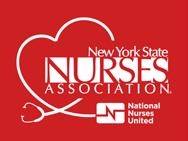
southern: Bronx, Kings, new York, Queens, richmond
Lower Hudson: Dutchess, putnam, rockland, Westchester
southeastern: nassau, suffolk
new Jersey/south: Atlantic, Burlington, Camden, Cape May, Cumberland, gloucester, Ocean, salem
Rate is 25% of 1.2% of the average starting salary in the region
Mark your calendars and get ready to meet fellow nurses and healthcare professionals from across New York on Oct. 23-24 in the heart of New York City. Registration, delegate, transportation, lodging and class
information will soon be available on our website at www.nysna.org/ Convention2023.
The theme of this year’s Convention is Nurses Leading from the Frontlines: Advocating and Winning for Our Patients and
The NYSNA secretary must receive amendments to the NYSNA bylaws no later than Aug. 9 and resolutions by Sept. 23. Convention delegates can mail proposed amendments to:
NYSNA, Nella Pineda-Marcon, Secretary
131 W. 33rd St., 4th Floor New York, NY 10001
Or e-mail them to info@nysna.org with the subject line: “Bylaws Amendment.”
Profession. We can’t wait to see you in person again this year, celebrate how far we have come this past year and participate in union democracy.
Convention delegates can mail proposed resolutions to the same mailing address above or email resolutions to info@nysna.org with the subject line: “Resolution.” For Convention delegates who plan to mail bylaws or resolutions, please write “NYSNA” and indicate on the envelope whether it’s a bylaw amendment or resolution. We are looking forward to hearing your ideas and taking advantage of this year’s Convention to share, learn and strategize together as union sisters and brothers.
The New York Relief Network (NYRN) has had a remarkable year.
All the medical missions have been full due to the enormous support of NYSNA members and many other volunteers who are making this program one of the most successful of its kind in the U.S. In the program’s last five years, volunteers have provided free medical care to more than 15,000 patients around the world.
Most recently, two groups undertook an educational mission to Cuba, visiting hospitals and community clinics and meeting with health professionals to educate themselves on Cuba’s healthcare system.
In April, despite altitude challenges, a brave group of nurses participated in the Peru medical mission, providing care to almost 300 patients from two tribes in the

Andes Mountains at 13,000 feet above sea level.
In May, another group returned to El Salvador, where 250 patients in two rural communities that rarely have access to healthcare sought help from our volunteers.
NYRN volunteers also returned to Zimbabwe in late May. A group of 13 nurses treated patients in the capital city of Harare, then traveled to the remote Darwin Mountains to provide care.

Several more missions are planned for 2023 and 2024. Learn more and sign up for a mission at www.nysna.org/nyrn.
Anyone can help to make our medical missions even stronger by making a tax-deductible donation to this humanitarian cause. There are several ways to donate on www.nysna.org/nyrn. Your generosity is very much appreciated.
